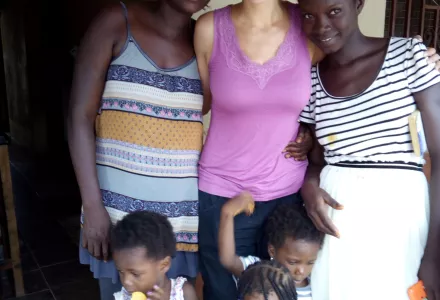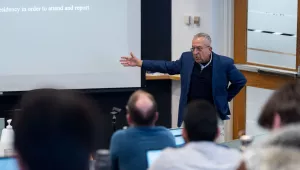
Zoe Marks is a Lecturer in Public Policy at Harvard Kennedy School. Her research and teaching interests focus on the intersections of conflict and political violence; race, gender and inequality; peacebuilding; and African politics. Her current book project examines the internal dynamics of rebellion in Sierra Leone to understand how and why rebel groups can sustain a viable threat to the state without widespread support.
In this Q&A, Belfer Center Communications Director Josh Burek asks Zoe Marks about her research, early career dreams, and experiences as a new faculty member at Harvard Kennedy School.
Q: What led you to focus your academic work on African Studies?
Marks: I’ve always been committed to racial justice and to understanding systems of violence and inequality. As I got older, I became increasingly interested in studying these issues on a global scale. Repairing my lack of knowledge about African politics was an obvious starting point.
What’s a leading misconception Westerners (even those at HKS) have about Africa?
There’s this pervasive idea that Africa is on the “margins” or that the continent has been left behind in the march of history. But African countries have long been central to the formation of the contemporary nation-state system and the global capitalist order. Now that globalization is happening at an exponential rate, African states foreshadow the challenges the rest of the world will soon be facing.
What do you wish more people understood about conflict and political violence?
Once war begins, it fundamentally changes the calculus and constraints of all actors. Instead of predicting why conflicts break out, I have studied how wars persist and why rebellion can be so resilient. Survival is a powerful motivator. Armed groups keep fighting if there are no exit pathways. That’s why finding ways to make “losing” today look better than losing tomorrow is so important for peacebuilding efforts.
What are you telling HKS students about their role in bringing about fuller gender equality?
This is such an important issue. Three concrete things spring to mind: First, I share my experiences as candidly as possible with women students in particular. Second, intersectional feminism teaches us that gender equality is only secure if everyone has equality. I try to make room for these conversations in my classroom by asking students to seek out missing voices, and I invite guest speakers who have been historically excluded or underrepresented at the Kennedy School. Finally, I am totally fortunate to have amazing women colleagues who I learn from and with whom I collaborate.
What are some of the most encouraging yet under-reported African trends you’re seeing?
Right now, the fastest-growing economies in Africa are not exporting oil and minerals, but rather are building diversified agrarian-led economies with high levels of intentional value-chain investment. Another exciting trend is the growing political voice of young people through digital communication and through mass mobilization. Finally, African women have always been hugely inspiring because of their ability to advocate powerfully for themselves. Ethiopian Prime Minister Abiy Ahmed’s gender-balanced cabinet is a powerful signal for people across the continent that women’s inclusion strengthens democracy and legitimacy.
What job did you want to have when you were 10?
I think by 10 I wanted to be president and a basketball star and maybe a lawyer (my back-up plan); but when I was younger, at 7, I was much more focused—I founded an Earth Club with my sister and best friend. We had only two meetings, but we had a flag.
Any stories you can share from your field work in Sierra Leone?
I think my favorite is the string of stories I collected while learning to cook Sierra Leonean food with the former wives of the rebel leader, Foday Sankoh. A lot of my work has focused on the essential roles women play in making war and rebellion possible. Cooking with women from the Revolutionary United Front was an incredible privilege, because in spending that time together they not only told me about their lives during the war, they taught me heaps about their present-day experiences, and educated me in local cuisine and cooking techniques.
Marks, Zoe. "Q&A: Zoe Marks." Belfer Center Newsletter. Belfer Center for Science and International Affairs, Harvard Kennedy School (Spring 2019).





